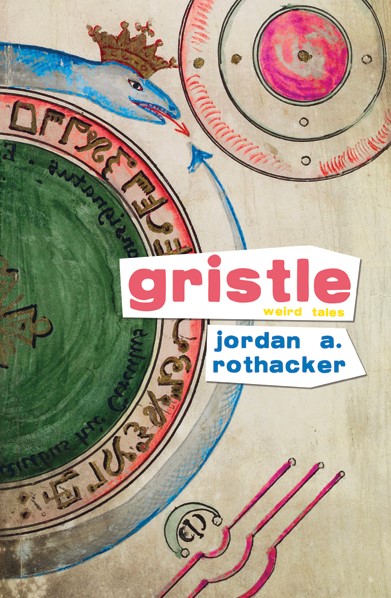Reviewed by Grace Dickerson

Gristle: Weird Tales, by Jordan A. Rothacker, delivers exactly what it promises—Rothacker provides his readers with a collection of short stories that explores the strange, sinewy bits of life. His stories, often strange and experimental, seek to examine the intricacies of life and living, frequently perplexing and unnerving the reader. While using expert prose, Rothacker’s stories delve into the complexities of God and religion, sex and relationships, pride and shame, and art and life.
Rothacker tackles these huge ideas, which might intimidate many authors, with gusto, using scenes and characters that are at times familiar, as he does in “Augustus and Anastasia” when Augustus meets the “perfect” girl, but is subsequently devastated later in the story when he learns that she already has a boyfriend; other times, Rothacker uses his stories to explore the foreign, as he does in “Parable Fourth,” where a wannabe artist stands isolated in a ghost town and reminisces on his father and the baby he has erased from the world in the name of art.
In most of his stories, however, Rothacker combines both the familiar and the unfamiliar to create a reading experience where the reader is able to relate deeply with a character, even with characters who would be considered terrible and foreign to most people. In, “Ooh Ooh, that Smell,” Jimmy Red, the son of a pig farmer, is teased terribly by his peers, and, in retaliation, when he finds a corpse, decides to set it on fire and watch it burn. Later, when his peers taunt him and beat him, he thinks back to how he finished off the corpse he found, comforting himself with the thought that he is a finisher and not a coward like his “bastard” peers.
While, hopefully, few of us have ever found a corpse and set it on fire, the concept of being taunted and underestimated is a familiar one for many, and Rothacker explores this degradation and desire for validation through the complex son of a vagrant pig farmer. Jimmy’s secret that he uses to comfort himself while he is being unfairly abused is not unlike how many people turn to music, writing, or baking to validate themselves when facing degradation and oppression, or how people comfort themselves with the thought of escaping their dead-end job while their boss is screaming at them or treating them unfairly. Rothacker expertly taps into these common feelings, by exploring a horrifying and (hopefully) entirely unfamiliar situation.
While “Ooh Ooh that Smell,” explores familiar feelings in an unfamiliar setting, “Stan of Changes” concentrates on the strange feelings that blossom out of the familiar. Stan’s story is set in the painfully familiar, but he secretly desires to join the world of the unfamiliar that lies in the sky, far beyond his grasp. It is based on the aggressively common life of Stan, who has a boring, run-of-the-mill office job, and is the tediously titled, “Head of Administrative Acquisitions and Maintenance Coordination.” Stan spends much of the story terrified that he will be fired from what he thought was a monotonously secure position.
After the sweet, smiling secretary with a position much like Stan’s own, is fired, he is filled with dread, and his normal, stagnant bachelor life is suddenly less enjoyable. In the midst of his anxiety, Stan dreams of Orion, the “superhero in the sky,” and he fills the ceiling of his one-bedroom apartment with paper stars. His story ends with his job being saved, but his assigned tasks are increased when he is casually reidentified as “Stan of Changes.” To escape this added monotony, Stan glues paper stars in the shape of Orion onto his back, stands next to his open window, and becomes a part of the night sky. Stan is an all too familiar dreamer who desires to be a hero and a star, but although he tries, he is unable to escape the common and ascend into a hero in the sky.
In addition to exploring universal human feelings, Rothacker makes room in his collection to experiment stylistically. His story, “Break the Skin,” explores the intense intimacy of a relationship in a scene where, a boyfriend examines a cut in his girlfriend’s skin. This scene is told entirely through dialogue but is done so expertly that the reader does not feel cheated by the lack of narrative and description. The boyfriend, while inspecting his girlfriend’s wound, muses on the weakness and strength that the cut implies. While dwelling on the internal workings of his girlfriend, he marvels at the fact that his own body was formed inside of his mother, and he was born out of a similar opening in his mother’s body. His is very aware that he is looking inside of a body that he has previously been inside of sexually, and desires to enter again. The cyclical concept of flesh and mortality is explored in the unique narrative of dialogue centered around a tiny cut. While fewer than 500 words, this story is still able to delve into the strange and the uncomfortable by exploring the intense, unfamiliar vulnerability of an open wound in the normally comfortable and familiar human body.
Rothacker toys with the bizarre in Gristle, until what is left for his reader is often more questions than answers. These eighteen short stories that will make you think about the difficult, gristly bits of life—love, sex, disappointment, death, living—just to name a few. This is a book filled with ideas that you will have to turn over and over in your mind and digest slowly.
